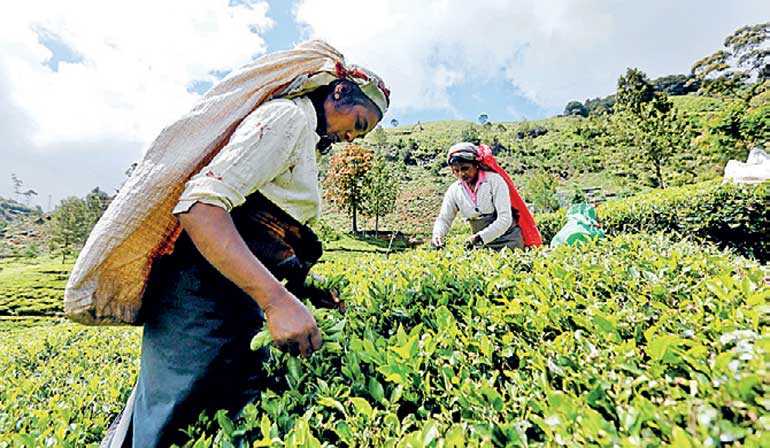Thursday Feb 26, 2026
Thursday Feb 26, 2026
Tuesday, 9 February 2021 01:28 - - {{hitsCtrl.values.hits}}

By Uditha Jayasinghe
|
Labour Minister Nimal Siripala de Silva
|
The Wages Board yesterday approved the Rs. 1,000 daily wage for the plantation sector, ending nearly two years of dragging discussions between Regional Plantation Companies (RPCs) and trade unions, clearing the way for the Labour Minister to gazette the salary increase within a week.
Labour Minister Nimal Siripala de Silva speaking to reporters on Monday afternoon hailed the breakthrough, which came after a marathon discussion lasting several hours between the RPCs and unions. He also said steps would be taken to gazette the decision before next Monday.
Since the issue could not be resolved amicably during the Wages Board meeting, Labour Commissioner General Prabath Chandrakeerthi had called for a vote and the salary increase had carried, receiving 11 votes in favour from Wages Board members with nine against.
“We are very happy that the Wages Board has prevailed and over 150,000 people and their families will benefit from this result. Under this decision the Rs. 1,000 daily salary will be made up of Rs. 900 basic salary and Rs. 100 Budget allowance from RPCs. We have proved the opposition and other detractors wrong and have carried out the pledge given in Budget 2021,” the Minister said.
Even though the tripartite collective agreement with a productivity-infused payment scheme traditionally used by the industry was set aside for the Wages Board to give the salary increase, de Silva appealed to workers to ensure higher productivity and support for plantation companies.
“We understand that this was not an easy decision for the RPCs. I have also sat in on at least 12 rounds of discussions since last August but since there was no decision I had no choice but to place the issue before the Wages Board. However, it is now essential that both workers and RPCs work together to develop the industry and ensure its sustainability,” he added.
Representatives from RPCs were not available for comment. Multiple attempts to reach former Planters Association Chairman and Hayleys Plantations Managing Director Dr. Roshan Rajadurai were also unsuccessful. However, RPCs had earlier routinely protested the move insisting it was “unsustainable” as the industry did not have the capacity to earn the additional Rs. 12.5 billion needed to meet the cost companies would have to pay if the daily wage is set at Rs. 1,000.
Companies had also pointed out Sri Lanka was already contending with high costs of production and low global prices, which would result in RPCs having to engage in serious cost cutting measures to meet the increased wage expenditure. The RPCs favoured a basic wage of Rs. 725, a price share supplement of Rs. 50 and EPF/ETF of Rs. 108 and an Attendance and Productivity Incentive of Rs. 225, which has been reintroduced. This, they argued, would take the daily wage beyond Rs. 1,000.
Under the RPCs proposals, a fixed daily wage model would have been applicable for three days a week. On the rest, employees were to be remunerated based on one of two productivity-linked earning models – one where employees will earn Rs. 50 for every kilo of tea leaves plucked, the other being the revenue share model where employees can become entrepreneurs.
However, the trade unions were adamant of a Rs. 1,000 all-inclusive wage, which will now be implemented by the Government.
Hit by the COVID-19 pandemic and other challenges, the Tea industry weathered a tough year in 2020, with exports down and production plunging to its lowest in 23 years, according to the latest report by Forbes and Walker Tea Brokers.
Tea export volumes in 2020 declined by 9.2% or 27 million kilos to 265.5 million kilos from the previous year, whilst in value terms, the performance was down by Rs. 10.4 billion or 4.3% to Rs. 230.1 billion from 2019, which recorded the highest figure. The latter is despite Free-on-Board (FOB) unit value of tea rising to its highest ever of Rs. 866.70 per kilo, up by 5.4% from 2019.